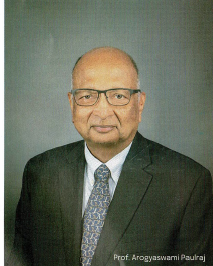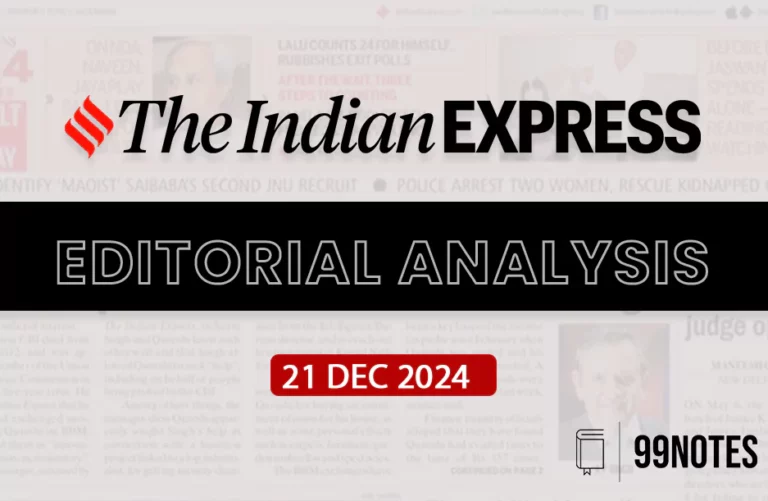22 April 2024 : Indian Express Editorial Analysis
Indian Express Editorial Analysis
22-April-2024
1. Cures, care, competition
|
Topic: GS2 – Governance – Government policies – Interventions for development in various sectors This topic is relevant for both Prelims and Mains in the context of understanding the dynamics of India’s pharmaceutical industry and the impact of patent laws on access to medicines. |
| Context: |
|
The Role of Generic Pharmaceutical Companies in India:
- Generic pharmaceutical companies in India have historically played a crucial role in providing essential medicines at affordable prices globally.
- Their ability to produce generic versions of patented drugs has been instrumental in lowering costs and increasing accessibility.
Impact of Amended Patent Rules:
- The recent amendments to Indian patent rules have raised concerns about their potential effects on the pharmaceutical ecosystem.
- By making it difficult to oppose patents at the pre-grant stage, the amendments could facilitate easier patenting and lead to an increase in drug prices.
- These changes could undermine the competition that generic companies provide, thus impacting affordability.
Historical Context: Evolution of Indian Patent Law:
- The evolution of Indian patent law, particularly the changes introduced in the early 1970s, allowed India to emerge as a major exporter of generic drugs by the late 1980s.
- However, subsequent international agreements, such as the TRIPS Agreement of 1995, mandated the re-introduction of product patents, posing challenges to India’s generic pharmaceutical industry.
Section 3(d) and Flexibilities under TRIPS Agreement:
- In response to these challenges, India introduced Section 3(d) to its Patent Act in 2005, aiming to prevent the patenting of insignificant modifications of existing drugs. This provision was upheld in the landmark Novartis case.
- Additionally, India amended its patent law to leverage flexibilities provided by the TRIPS Agreement, such as opposition to patents at various stages and compulsory licensing in the interest of public health.
Pressure from Pharma Majors and Impact on Patent Opposition:
- The recent amendments to Indian patent rules have been influenced by pressure from pharmaceutical giants, particularly Western and Japanese companies.
- These changes, including the dismissal of pre-grant oppositions without hearing, could stifle competition, discourage generic companies from opposing patents, and ultimately drive up drug prices.
Financial Burden and Lack of Transparency:
- The requirement for opponents to pay fees for filing oppositions adds a financial burden, potentially deterring patients and civil society organizations from challenging frivolous patents.
- Moreover, the alteration of reporting requirements for patent holders could hinder transparency and accountability regarding the production of patented drugs, making it harder to enforce compulsory licensing.
Conclusion:
- Overall, the amended patent rules in India are likely to prolong the life of patents, increase drug prices, and create barriers to access for patients.
- These changes represent a significant challenge to the principles of affordability and accessibility that are crucial for a functioning healthcare system.
| What is a Patent? |
|
| PYQ: Bring out the circumstances in 2005 which forced amendment to section 3(d) in the Indian Patent Law, 1970. Discuss how it has been utilized by Supreme court in its judgment rejecting Novartis patent application for “Glivec”. Discuss briefly the pros and cons of the decision. (200 words/10m) (UPSC CSE (M) GS-3 2013) |
| Practice Question: Explain the recent changes in Indian patent rules and their impact on access to affordable medicines. Discuss how these changes affect the availability of generic drugs and healthcare affordability in India. (250 words/15 m) |
2. A many splendoured field
|
Topic: GS2 – Polity – This topic is relevant for both Prelims and Mains as the analysis provides insights into the functioning of India’s democratic institutions, electoral processes, and the role of political parties. |
| Context: |
|
Resilience of Indian Democracy:
- India’s elections, characterized by thousands of political parties and candidates, demonstrate the resilience of democracy amid geographical and socio-economic diversity.
- However, global media often misunderstands the complexity of India’s democracy, leading to flawed assessments of its health.
Contradictory Democratic Rankings:
- Contradictions arise in global democracy rankings, such as the Democracy Index and Press Freedom Index, where countries like Mexico rank higher than India despite facing issues like political violence and threats to journalists.
- These inconsistencies highlight the need for a nuanced understanding of democracy’s nuances in diverse contexts.
Misleading Narratives:
- Phrases like “democratic backsliding” and “shrinking freedom of expression” are often misapplied to India’s democratic landscape.
- Despite vibrant political competition and diverse media expression, alarmist narratives persist, overlooking India’s institutional integrity and electoral vibrancy.
Prime Ministerial Outreach:
- Prime Minister Narendra Modi’s inclusive approach across the political spectrum challenges critics’ narratives.
- His government’s decisions, such as conferring honors on leaders from various parties, underscore a commitment to recognizing diverse ideological persuasions.
Rule of Law and Accountability:
- India maintains a competitive political playing field while holding politicians accountable for alleged corruption and tax evasion.
- Unlike some Western democracies where politicians face legal consequences, India’s legal process is often questioned, undermining judicial independence and constitutional values.
Conclusion:
- India’s democracy remains vibrant and competitive, upholding the rule of law and constitutional values.
- Critics’ alarmist pronouncements often overlook India’s complex realities, reducing themselves to partisan agendas rather than engaging in informed discourse on democracy’s nuances.
| What is the importance of voting in a parliamentary democracy? |
|
| PYQ: In the light of recent controversy regarding the use of Electronic Voting Machines (EVM), what are the challenges before the Election Commission of India to ensure the trustworthiness of elections in India? (150 words/10m) (UPSC CSE (M) GS-2 2018) |
| Practice Question: Explain the significance of the Indian electoral process, emphasizing its scale, technological advancements, and ability to manage diverse socio-economic complexities. (150 words/10 m) |
For Enquiry

22 April 2024 : Indian Express Editorial Analysis

20 April 2024 : Daily Current Affairs Quiz

20 April 2024 : Daily Answer Writing

20 April 2024 : Daily Current Affairs

20 April 2024 : PIB Summary for UPSC

20 April 2024 : The Hindu Editorial Notes PDF

20 April 2024 : Indian Express Editorial Analysis

SCIENCE REPORTER SUMMARY: JANUARY 2024

19 April 2024 : Daily Current Affairs Quiz

19 April 2024 : Daily Answer Writing
April 2024 Indian Express 22 April 2024 : Indian Express Editorial Analysis Indian Express Editorial Analysis
20-April-2024
1. Cures, care, competition
Topic: GS2 – Governance…
Daily Quiz 20 April 2024 : Daily Current Affairs Quiz 20- April 2024 : Daily Quiz…
mains answer writing 20 April 2024 : Daily Answer Writing Mains Answer Writing
20-April-2024
Q1) Assess the present computational methodology for Gross Domestic…
April 2024 Daily Current Affairs 20 April 2024 : Daily Current Affairs Daily Current Affairs
20-April -2024- Top News of the Day
1. Israeli Military Strikes Iran in Apparent…
April 2024 PIB 20 April 2024 : PIB Summary for UPSC PIB Summary for UPSC
20-April-2024
1. High turnout in Phase 1 of Lok Sabha Elections 2024 despite heat…
April 2024 The Hindu Editorial 20 April 2024 : The Hindu Editorial Notes PDF The Hindu EDITORIAL
20-April-2024
1. Israel, a two-state solution, some recent perceptions.
Topic:…
April 2024 Indian Express 20 April 2024 : Indian Express Editorial Analysis Indian Express Editorial Analysis
20-April-2024
1. A BITTER SWEET
Topic: GS2 – Social Justice –…
Science Reporter SCIENCE REPORTER SUMMARY: JANUARY 2024 ARTICLE 1: India-born Prof. Arogyaswami Paulraj Receives Faraday Medal for Pioneering MIMO Technology
Awards…
Daily Quiz 19 April 2024 : Daily Current Affairs Quiz 19- April 2024 : Daily Quiz…
mains answer writing 19 April 2024 : Daily Answer Writing Mains Answer Writing
19-April-2024
Q1) Critically evaluate the performance of Goods and Services Tax…


